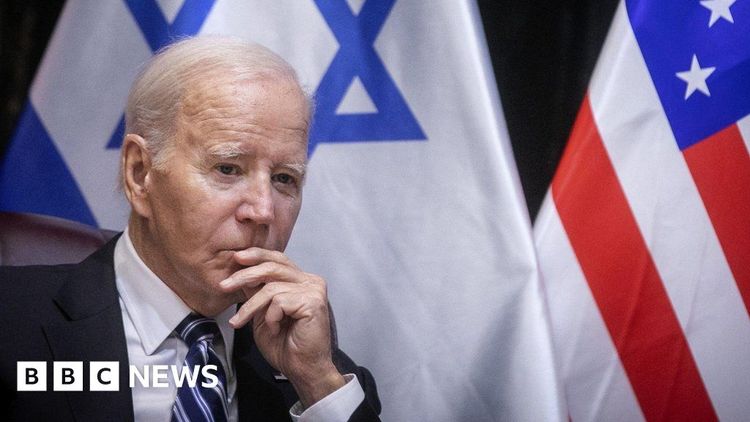Jeremy Bowen: Joe Biden's search for a Middle East solution just got harder

The blog section is dedicated to bringing you informative and engaging content. Our goal is to provide you with insightful articles that educate, entertain and inspire. We cover a wide range of topics including health and wellness, travel, technology, business, and more. Our team of writers and contributors are passionate about what they do, and they bring a wealth of knowledge and experience to each article. Whether you're looking for tips on how to stay healthy, or you want to learn about the latest trends in technology, we've got you covered. So, why not take a few minutes to browse our blog section? You're sure to find something that interests you, and we're confident that you'll enjoy reading our articles. Thanks for visiting, and we look forward to sharing our knowledge with you!

An injured person from Palestine was transported from Al-Ahli Hospital located in Gaza City.
Prior to the destruction of the Al-Ahli hospital in Gaza, Joe Biden's unwavering backing of Israel had made Palestinians and numerous other Arabs believe that the United States was more than just Israel's top advocate. They thought that the Americans were also involved in everything Israel was carrying out in Gaza, which included the murder of innocent children.
The contentious argument about who caused the assault is unlikely to sway opinions. The hostility and separation have intensified after the twelve days of warfare.
Israel presented a comprehensive response to allegations that it was behind the attack on Al-Ahli. They provided proof that demonstrated a missile supposedly launched by Palestinian Islamic Jihad had a malfunction and fell far away from its intended destination in Israel.
To Palestinians, including those who do not necessarily support Hamas, the heaps of body bags stained with blood were sufficient evidence. Their interpretation of the events at Al-Ahli was not based on a difference in principles, but rather on a difference in degree. Israel has been taking the lives of numerous Palestinians every day since retaliating to the unexpected assault by Hamas. Prime Minister Benjamin Netanyahu informed Joe Biden that the attack had led to the demise of a minimum of 1,400 individuals, primarily Israeli civilians. For Palestinians, the events at Al-Ahli were further confirmation of Israel's disregard for their existence.
As Air Force One's engines were preparing to take Joe Biden to the Middle East, news broke about the hospital's devastation. This unfortunate event disrupted the President's plans before he even left.
President Biden holds a strong dedication towards Israel. It must have appeared instinctual for him to travel to Tel Aviv to demonstrate his backing and publicly embrace Mr. Netanyahu.
Biden was anticipating finding a way to counteract this issue at a last-minute gathering in the city of Amman, which is the capital of Jordan. At this meeting, he intended on meeting with the king of Jordan, the president of Egypt, and the Palestinian president.
Mr Biden spoke in favor of the Israeli statement about the explosion that took place at a hospital in Gaza.
However, Jordan decided to call off due to the issue with Al-Ahli. Mahmoud Abbas, the president of Palestine, rushed back to his headquarters located in Ramallah, which is situated in the area controlled by Israel. Saudi Arabia, the United Arab Emirates (UAE), Egypt, and Jordan issued official statements denouncing Israel.
President Biden is facing a tough journey ahead. Typically, leaders only embark on diplomatic trips once important negotiations have been completed and an agreement is close to being reached. Unfortunately, there's a chance that he may return empty-handed to the capital city.
In addition to standing behind Israel and urging them to abide by the rules of war, President Biden is also aiming to emphasize that the conflict should not escalate. To make this clear to Iran and their associates in Lebanon - both the Hezbollah political group and their military faction - he has sent two aircraft carrier battle groups to the eastern Mediterranean. This is a signal to these parties that the United States will be a force to be reckoned with if they choose to become involved.
Leaders both in and outside of the Middle East are currently facing a challenge due to the ongoing conflict between Hamas and Israel as they are navigating uncharted waters. Previously, they were guided by familiar beliefs and assumptions, but these have now been overturned and are no longer applicable.
Before the Hamas attacks in Israel on October 7th, the situation in the Middle East seemed quite familiar. There was a certain status quo that everyone was accustomed to. While no leader in the region or their allies were particularly fond of it, it did at least provide some level of stability.
Israeli troops are expressing their grief by embracing one another after a fellow soldier was lost in the violent Hamas assaults.
When Hamas launched their attack, many Palestinians were caught off guard, just like everyone else. There were even some who had previously voiced their disapproval of Hamas for allegedly neglecting its Islamic roots, as the Arabic acronym for the group is the "Islamic Resistance Movement."
Many politicians in Israel have criticized Mr Netanyahu for not being vigilant when Hamas invaded and for overseeing a disastrous failure in military and intelligence. The public had faith that their government would ensure their safety.
Mr. Netanyahu had a false belief that he could control the Palestinians without giving them their own state, which was another misconception. He thought that negotiating with Hamas on topics such as worker quotas would help with this.
Simultaneously, Mr. Netanyahu employed a traditional approach of splitting and conquering as he tried to weaken the Palestinian Authority, the primary opponents of Hamas for guiding the Palestinians. The Palestinian Authority participated in numerous ineffective peace discussions over time and acknowledged Israel several decades ago. However, for Israel to initiate another round of negotiations, they would have to talk about handing over territory to the Palestinians for a potential state with its capital located in Jerusalem.
Mr. Netanyahu, who is currently leading a government supported by extreme religious nationalists, completely disregards the idea of concessions. He has shown no indication of ever wanting to make such a move and found it easier to claim Israel had no partner for peace. If Israel wants to avoid future conflicts, Mr. Netanyahu or his successor will need to alter their perspective. It's crucial for them to consider new approaches that could benefit the coming generation.
The leaders of America's Arab allies are being reminded that the issue of the Palestinians can't be overlooked. Jordan and Egypt have already made peace deals with Israel and the UAE recently normalized relations in the Abraham Accords. They were all looking forward to benefiting from Joe Biden's plan to create a new Middle East by facilitating a deal in which Israel and Saudi Arabia would recognize each other in exchange for security assurances from the US. Biden's team believed that progress was being made, however, it appears that a reconciliation between Saudi Arabia and Israel is no longer a priority.
Arab leaders, including kings, princes, and presidents, are having unpleasant memories resurface due to the ongoing Gaza conflict and the recent hospital attack. These recollections trace back to the end of 2010 when an enraged and dissatisfied vendor in Tunisia self-immolated as a form of dissent against oppressive and deceitful government officials. This act resulted in the Arab uprisings of 2011, which instilled fear in rulers who believed that they might lose all of their possessions, status, and, even more significantly, their existence.
The article below was taken from a blog. The photo used in the article is from Getty Images. Rewritten: The following piece was retrieved from a blog. The picture accompanying the writing was sourced from Getty Images.
In Tunisia 2011, the Arab Spring started because people were angry about the passing away of Mohamed Bouazizi, who was a market vendor.
If the demise of an irate youngster in Tunisia could trigger a chain of uprisings, what would be the cost of a conflict that claims the lives of numerous innocent Palestinian individuals?
In just under two weeks of violence, it has become clear that our previous beliefs were unfounded. The aftermath of the conflict will bring about a new situation. The jolt of the situation may inspire innovative ideas, but if it only provides reinforcement of the same old approach, the future appears dismal.
Digging Deeper Into Israel-Gaza Conflict
If you happen to be situated in the area, and it is deemed secure, kindly share your personal encounters by sending an email to [email protected].
If you're open to speaking with a BBC reporter, kindly provide a contact number. You can also reach out to us through the following means:
In case you cannot find the form, kindly visit the mobile version of the BBC website to send in your queries or remarks. Alternatively, you can email us at [email protected] and make sure to mention your name, age, and location while submitting.













































































